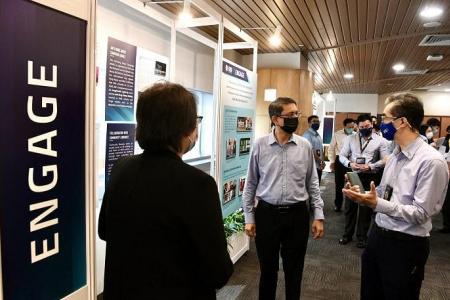Legislative changes being considered to curb abuses of court processes: Faishal
The authorities will consider legislative changes to curb abuses of court processes in their fight against drugs, Minister of State for Home Affairs Muhammad Faishal Ibrahim said on Tuesday (May 31).
In his opening speech at the annual Central Narcotics Bureau (CNB) Workplan Seminar, he referred to the case of drug trafficker Nagaenthran K. Dharmalingam, who was executed on April 27 after a controversial appeal process in court.
His bid to challenge the death sentence on the grounds that he was mentally disabled was rejected by the apex court.
Chief Justice Sundaresh Menon said then that the case mounted by the defence was an abuse of the court's processes as there was no admissible evidence to prove a decline in the accused's mental condition.
Associate Professor Faishal, who is also Minister of State for National Development, said at the Police Cantonment Complex auditorium: "We acknowledge that there are those with passionate views about the use of capital punishment in Singapore.
"But we must respect the law and the administration of justice: The proper mode to engage on such issues is certainly not through making last-minute, unmeritorious applications to obstruct the course of justice."
He added: "We will be looking at legislative amendments to curb such abuses of court process."
He did not elaborate on the possible amendments and when these will be announced.
In a 20-minute speech, Prof Faishal reiterated that the death penalty is effective in deterring those who traffic large quantities of drugs.
A 2018 study by the Ministry of Home Affairs found that drug traffickers were highly aware of capital punishment here and had reduced the amount of drugs they trafficked to below the capital threshold, he said.
"To address some critics of the death penalty, we must remember that these are not small amounts we are talking about," he added.
"To cross these (capital) thresholds, one would not be carrying drugs for personal consumption. Instead, it would be for mass distribution to others for financial gain."
Globally, the market for methamphetamine is expanding in the East and South-east Asia, the minister said, adding that pro-cannabis lobby groups have pushed for more liberal drug control policies.
Prof Faishal cited Thailand as one of the countries that have opened up to the recreational use of cannabis, removing it from the country's list of controlled drugs in January this year.
Amid these challenges, he said 25 drug syndicates were dismantled in Singapore last year, with more than $18 million worth of drugs seized.
He added that the proportion of new drug abusers remained high, making up for around a third of drug abusers arrested last year.
To bolster drug enforcement and investigations, CNB has rolled out new technologies that were showcased during the seminar. These include a portable general drug screening test kit, which works like a litmus test to instantly reveal the presence of controlled drugs from a suspicious sample of substances.
Prof Faishal said the fight must continue despite concerns about more liberal attitudes about drugs among youth.
He referred to a spate of drug-related incidents in March that involved violent suspects who were armed, such as a sword-wielding attacker who had taken unknown pills and damaged cars and attacked a man at Buangkok Crescent.
A man who was shot when he threatened police officers with a knife in Bendeemer was a known drug offender wanted by CNB; another man in Queenstown who had a history of drug abuse injured two strangers with a blade, said Prof Faishal.
He said drugs also cause immense harm to the lives of abusers, their families and children, who may grow up without a role model.
"These are the reasons why we continue to take a strong stance against the scourge of drugs, to try to break the cycles of drug addiction, and curb the wider harms of drugs on our society."
Get The New Paper on your phone with the free TNP app. Download from the Apple App Store or Google Play Store now


